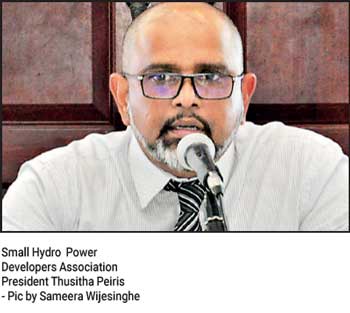Monday Feb 16, 2026
Monday Feb 16, 2026
Saturday, 5 August 2023 01:16 - - {{hitsCtrl.values.hits}}
 By Darshana Abayasingha
By Darshana Abayasingha
The Small Hydro Power Developers Association (SHPDA) says the industry recently received Rs. 30 billion in outstanding payments from the CEB, and dues have now come down to 10 months from 14.
However, the industry is faced with severe challenges, especially as vested parties are funding NGOs
to disrupt Small Hydro Power Develo-pers to achieve their business ends. The CEB must pay up to Rs.
250 million daily for energy sourced from small hydro generators.
SHPDA President Thusitha Peiris told its Annual General Meeting recently that payments were secured during discussions with the CEB, the PUCSL and the Treasury. However, with the CEB once again revising rates downwards impacting its revenue, the industry could once again experience pressure to obtain payments, the Association noted.
There are 211 Small Hydro Power projects in the country, and the Association said it stands for the benefit and advancement of all players.
Speaking to the Daily FT, Peiris said it was noted that several parties including suppliers and players in alternative power projects such as coal are funding NGOs to cause trouble for the industry, as mini hydro poses a threat to their operations.
Pointing out that hydro presents one of the cleanest forms of energy generation, Peiris said these vested groups are prompting NGOs to call for regressive regulation of the industry to stifle new investments, progress and operations.
“NGOs are trying to bring in regulations to control us. We are all local investors and have borrowed at high rates of interest and are not able to service our facilities as we haven’t been paid. What we are trying to do is safeguard our identity and future investments. They (NGOs) are trying to disrupt this industry by bringing in all these obstacles. They are trying to disrupt the viability of this industry,” Peiris said.
The Association said NGOs are lobbying to force small hydro power producers to change the e-flow which will disrupt generation, and are lobbying the Irrigation Department to change legislation regarding mini hydro stations. NGOs are trying to enter their projects and since they have no legal mandate to do so, they are trying to achieve this end through various departments, they said. Peiris noted that many of these NGOs do not have any form of registration, but enjoy clout through sponsorship.
“They are saying the public must have a say over the e-flow of a facility. If third parties enter our projects then this industry becomes unsustainable. They are also trying to say retired engineers cannot be engaged with our projects for five years. In that case, could we also have access to see who is funding these people? This association will not allow third parties to take control, and we urge our membership to take note,” the President noted.
The SHPDA is looking forward to the proposed restructuring of the CEB, as the formulation of a new act presents an opportunity to develop a separate and appropriate mandate and regulations for small hydro projects. The Association is also hoping it could safeguard revenues of the industry through a reflective tariff system with timely payments, and revealed 16 projects are waiting to sign extensions based on a new tariff scheme.